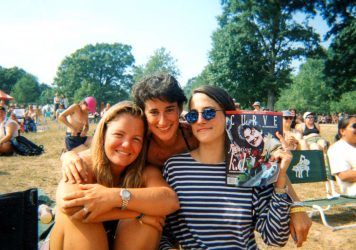This fittingly radical documentary chronicles the feminist punk subculture which sprung in London in the 1980s.
Against a backdrop of 1980s austerity and oppression, a group of punk lesbian activists and artists meet at the Greenham Common peace camps and begin to drift towards the squats of South London. This is where punk rebellion and its disruptive spirit turn into direct action and loud protest against the silencing strategies of Section 28 and the AIDS epidemic.
The punk music of the Sleeze Sisters and the Sluts from Outer Space blasts at The Bell pub in King’s Cross, and the unequivocal hedonism of the ’80s SM dyke scene is embraced in the erotic magazines ‘Love Bites’ and ‘Quim’. These intersections of politics and intimacy, party and protest, allow filmmakers Harri Shanahan and Sîan Williams to produce a historical and artistic archive of a cultural history that sits outside of general knowledge.
For marginalised groups, especially in the subcultural context, access to the archive can be a major challenge. Archives are spaces of violence as well as power, so how can documentary filmmakers produce work that is politically critical of this fact while retaining a broad appeal? The aesthetics of club culture that were so dominant in characterising the dyke subculture are aptly reflected in this videographic depiction of life as a rebel dyke squatter in the Thatcherite ’80s – a time where the sex wars were raging.
A vibrant SM lesbian club night called Chain Reaction becomes an intimate meeting point as well as trans-inclusive safe haven, embracing sexual performativity and renegotiating sexual relations through mutual exchanges of power based on consent. While Greenham feminist separatists drew comparisons between militarism and everyday male violence towards women, they saw sadomasochism as a reenactment of domestic violence relationships.
SM lesbians were being called violent and sexist, and this caused schisms within feminism to grow. It’s impossible not to draw ties between the dangerous rhetoric of the the radical feminists of the ’70s and ’80s, the “lesbian sex police” as shown within the film, and the unhinged, violent ideologies of today’s trans-exclusionary radical feminists.
The documentary’s critique of a British feminism that relies on essentialist notions of womanhood and female sexuality points to the fact that liberation movements lose all substance and texture in their inability to take difference into account.
The film juxtaposes memories of personal pleasure with experiences of deeply felt emotion. It is an invaluable community profile that finds expression in a mosaic of intimate oral histories. Mimicking the visual language of a zine, the film’s DIY aesthetic is signalled through an archive of underground ephemera, a patchwork of gritty archival footage and photographs from the legendary visual artist Del La Grace Volcano, as well as original – albeit often rudimentary and misplaced – sequences of animation.
By capturing the culture of fetish, party and riot, feminism, sex and politics, this unique blend of styles offers a fitting representation of a punk subculture that gave ’80s queer and feminist activism its vibrancy.
Published 24 Nov 2021
The BFI Flare hit promises to highlight the legacy of an underground radical scene.
A palpable labour of love with a robust political edge.
A portrait of lesbian sexuality and survival that doesn’t pull its punches.

This illuminating documentary profiles extraordinary women musicians who shaped electronic sound.

By Katie Goh
Dykes, Camera, Action! features first-hand accounts from Barbara Hammer and Desiree Akhavan.

This engaging documentary celebrates the work of an iconic lesbian publication and its fearsome creator.